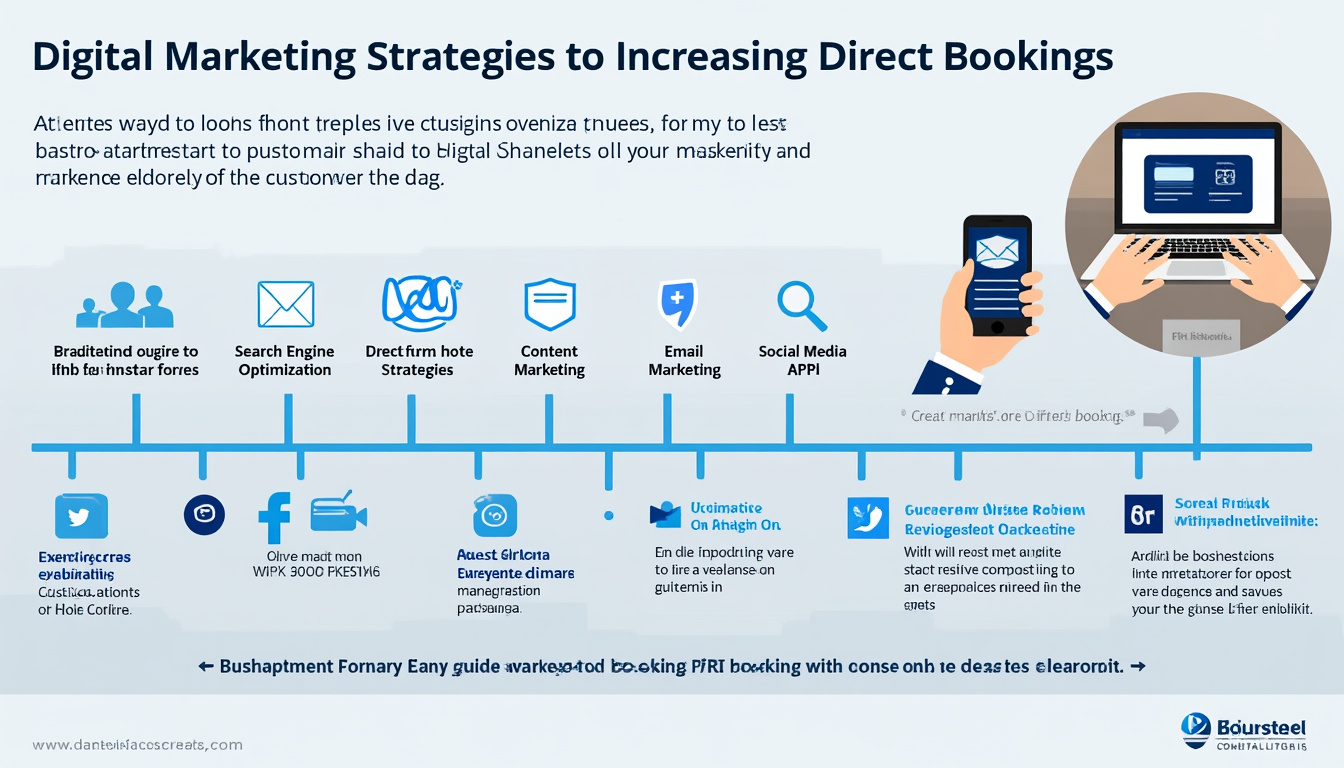The hospitality industry undergoes a significant transformation as hotels reassess their relationships with online travel agencies (OTAs). In this context, major brands like Marriott, Hilton, and Hyatt are leading the charge towards a substantial increase in direct bookings, driven by evolving consumer preferences and legal dynamics affecting OTA partnerships. The growing discontent with the commission structures and escalating costs associated with OTAs is pushing hotels to prioritize direct sales channels. This article explores the multifaceted reasons behind the shift, examining legal challenges, market dynamics, and effective marketing strategies that encourage hotels to reclaim their guests.

The Legal Landscape Impacting OTA Partnerships
Legal issues surrounding OTAs have created a complex environment for hotels. A notable case involves 10,000 hotels in Europe suing Booking.com over parity clauses that violate EU competition laws. These clauses often require hotels to offer lower prices on OTA platforms than on their direct booking sites, effectively limiting price competition and creating undue pressure on margins.
This legal backlash highlights a significant shift in the hospitality sector, as hotels become increasingly disillusioned with their reliance on OTAs. They are exploring alternative distribution methods that encourage direct bookings, thus reducing commission fees that can often exceed 15-20% of the total booking cost. The reduced dependency on OTAs resonates with many industry veterans who advocate for better profit margins and enhanced guest relationships.
The Parity Clause Controversy
The parity clause controversy not only seeks to redefine the relationship between hotels and OTAs but also compelled hotels to confront existing contracts and explore new ways to engage customers directly. Legal scrutiny over these agreements has prompted many hotel chains to negotiate better terms or withdraw entirely from agreements with platforms like Expedia and Agoda.
While the legal battles continue, the resulting publicity surrounds these issues, creating an opportunity for hotels to educate their customers about the benefits of booking directly. Reducing reliance on OTAs not only preserves finances but helps in building a loyal customer base that feels valued and recognized.
- Legal scrutiny over OTA agreements: Hotels reevaluating contracts with OTAs.
- Consumer education: Increasing awareness about booking benefits.
- Financial preservation: Reducing commission costs improves hotel profitability.
As hotels navigate this challenging legal landscape, the need for a diversified and direct approach remains more critical than ever. By fostering direct connections with customers, properties can ensure flexibility when adjusting rates and offerings, a situation that serves their long-term interests better than the current reliance on OTAs.
The Emergence of Direct Booking Initiatives
The trend towards increasing direct bookings is not limited to legal challenges; it is also fueled by hotels recognizing the necessity of investing in digital marketing strategies. Recent studies have indicated that OTAs now account for only 22% of hotel bookings, significantly down from 30% the previous year, according to the State of the Distribution Report published by RateGain and New York University.
In this shifting landscape, hotels are enhancing their marketing strategies through advanced technology. This includes implementing sophisticated customer relationship management (CRM) platforms, enhancing their websites for a seamless user experience, and utilizing data analytics to track consumer behavior. These tailored marketing efforts are driving more consumers towards direct bookings.
Investments in Marketing Technology
To strengthen direct sales efforts, hotels are investing in several key areas:
- Website Optimization: Enhancing user experience through mobile-friendly designs and easy navigation.
- SEO Strategies: Increasing visibility through optimized search engine friendliness.
- Social Media Engagement: Creating strong online presences across platforms like Instagram and Facebook to reach potential customers.
For instance, major hotel chains such as Accor and IHG have adopted comprehensive strategies that include targeted online advertisements, enticing loyalty programs, and unique promotions that reward customers for booking directly. This proactive stance not only reduces the need for OTA involvement but also cultivates lasting relationships with guests.
| Hotel Chain | OTA Bookings (2024) | Direct Bookings (2024) |
|---|---|---|
| Marriott | 25% | 75% |
| Hilton | 30% | 70% |
| Hyatt | 28% | 72% |
Hotels are marketing their unique features, personalized services, and rewarding loyalty programs to distinguish themselves from OTA offerings. Guests are more inclined to book directly when they see tangible benefits, such as lower prices or exclusive experiences, reinforcing hotels’ decisions to prioritize direct relationships.

Market Observations and Trends in Direct Bookings
Recent observations within the industry reveal a consistent decline in OTA bookings in favor of direct bookings. According to Thibault Catala, CEO of Catala Consulting, hotels have noted a year-on-year increase of 8%-15% in direct bookings across Europe, while OTA bookings have shrunk by approximately 5-12 percentage points.
This evolving pattern reflects changing consumer behavior, where travelers are increasingly seeking to connect with hotels directly to gain a sense of trust and familiarity. Increased marketing efforts by hotel brands have undeniably played a pivotal role in shaping consumer preferences and encouraging more direct interactions.
Encouraging Direct Engagement
With the rise of vacation rentals and alternative accommodations, traditional hotels face stiff competition, making it crucial to foster direct engagement. Travelers prioritize personalized experiences over the cookie-cutter offerings often associated with OTAs. By building direct relationships, hotels can emphasize their distinctive features, local knowledge, and tailored offerings.
- Unique Selling Points: Highlighting special amenities, local tours, and personalized packages.
- Customer Loyalty Programs: Encouraging repeat bookings by rewarding guests for returning.
- Transparent Communication: Fostering trust with clear information on policies and services.
As hotels continue to innovate their service offerings, a concerted focus on direct engagement can help solidify their market position and enhance customer retention. Emphasizing direct communication with guests generates loyalty that OTAs cannot replicate.
The Influence of Alternative Accommodations
The rise of alternative accommodations, including platforms like Airbnb and Trivago, is shaping market dynamics and affecting the competitive landscape within the hospitality industry. With alternative rentals offering unique experiences that traditional hotels often cannot match, they draw a significant portion of the consumer base, particularly among younger travelers looking for flexibility and local authenticity.
As indicated by Key Data’s Q2 U.S. Vacation Rental Index, the revenue growth in vacation rentals outpaces that of traditional hotels, showcasing a shift toward leisure-led travel. Hotels are responding by emphasizing unique experiences tailored to leisure-driven travelers, enhancing amenities that rival those found in vacation rentals.
Strategic Responses to Market Competition
To better compete with alternative accommodations, hotels are adopting various strategic approaches:
- Enhanced Guest Experiences: Offering curated experiences, local tours, and adventure packages.
- Technology Integration: Utilizing apps and contactless service options to cater to modern travelers.
- Flexible Cancellation Policies: Creating a more accommodating environment for guests who seek reassurance in changing travel conditions.
These adaptations are not only appealing to travelers but also signal a broader effort to reclaim the market share lost to alternative accommodations. By fostering unique offerings that resonate with contemporary traveler expectations, hotels can bridge the gap and restore their competitive edge in a rapidly evolving landscape.
Diversification Strategies from OTAs
As hotels shift toward direct bookings, OTAs like Booking.com and Expedia are diversifying their offerings to adapt to these changes in market dynamics. Booking.com has rolled out features that extend beyond traditional hotel inventory, including over 8.4 million listings for alternative stays, allowing them to meet diverse consumer preferences.
Moreover, these platforms are actively promoting a concept referred to as a « connected trip, » where consumers can book multiple travel services through a single platform. This strategy aims to enhance the overall travel experience and encourage loyalty among travelers reliant on OTA services for planning and booking.
OTA Innovations and Competitive Strategies
To stay competitive in this evolving environment, OTAs are employing several tactics, such as:
- Diverse Accommodation Types: Expanding offerings to include vacation rentals, cabins, and unique stays.
- User Experience Improvements: Enhancing their platforms to streamline the booking process.
- Engagement Strategies: Implementing referral programs and loyalty rewards to foster repeat business.
While OTAs continue to expand their offerings, hotels focusing on direct bookings must navigate this competitive landscape carefully. The ongoing evolution presents numerous opportunities for both parties, as they find innovative solutions to keep up with consumer preferences and changing market trends.
